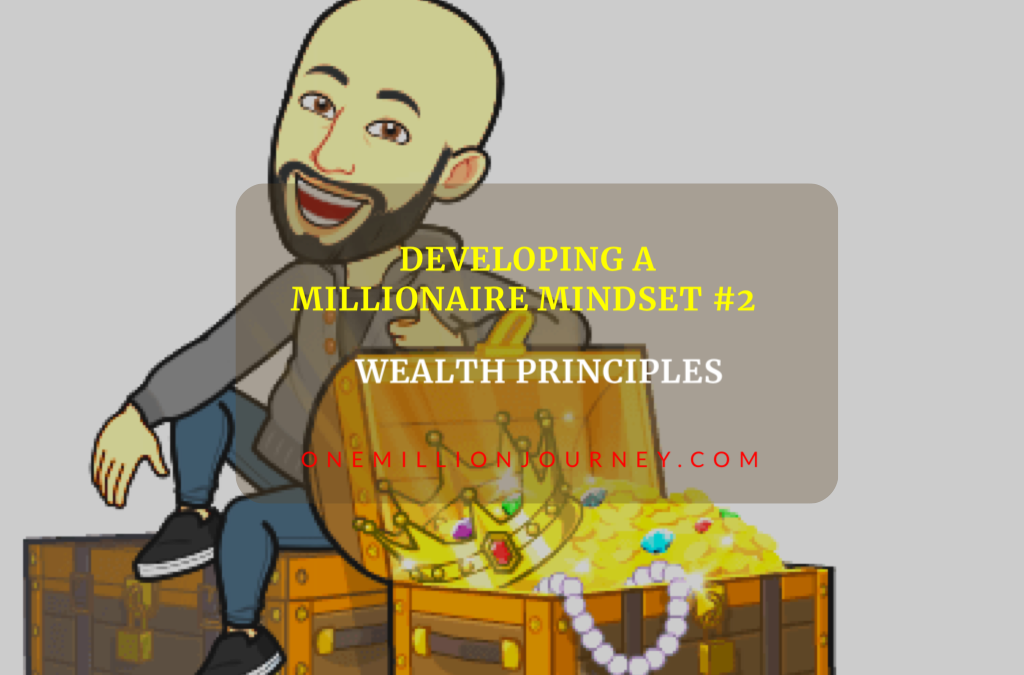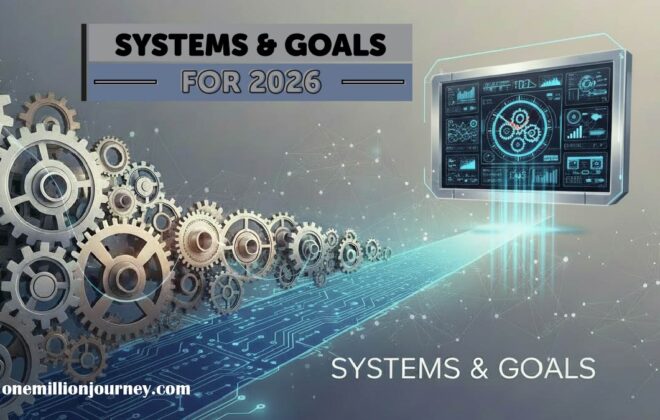The Millionaire Mindset #2 – Wealth Principles
This is the second post of the millionaire mind series. It focuses on wealth principles. In the first post of the series, we looked into the process of manifestation and found out that our mind and thoughts are pretty much the basement of our life as well as the home of our roots. We also learned that the strength and health of these roots will depend on our thoughts, thoughts which lead us to have feelings, feelings that make us take action and action that bring us a result.
My lifetime financial goal is to become a millionaire, I want to be rich. Rich enough to provide financial freedom to me, to those I love, and to my future family. Rich enough to tell my boss that I don’t need him anymore, that I now make my own decisions and do things my way, rich enough to become the owner of my own time and of my own life, rich enough to be the master and captain of my soul, body and mind. I also want to be rich enough to even make future financial mistakes and still be able to be 100% in control, or in other words, have a margin of safety in case things turn sideways, which eventually happens.
But, there’s no such thing as free money, or is it?
Nope, I know I must work for it, I must make results, overcome challenges, accomplish other little goals, fall down, stand up, make mistakes, learn from them, become stronger, remain positive and so on.
So, what do I need to do in order to succeed at becoming a millionaire and financially independent? What do I need to do to bring that result that I truly want?
”Simple”:
I need to think as rich people do! Isn’t it obvious?
Table of Contents
Is your mind trained to become wealthier or poorer? Find out your millionaire score!
This post is once again inspired by T. Harv Eker’s and his book “Secrets of a millionaire mind”. This is a personal development post.
He states that our mind is like a big file cabinet containing archived information that will be used at some point or another.
Let me ask you dear reader, what does your mind contain? Does it contain information that will make you richer or poorer? Does it keep the “right” information to succeed? The info you require? Perhaps, there’s a piece of information missing, something that you would need but don’t have yet? Or, maybe there’s not even information? (Homer Simpson has only monkeys apparently!). Or, it could be that some data has been kept in the wrong folder? – Oops! We all make mistakes after all, don’t we?
Eker’s book mentions 17 wealth principles that rich people keep and protect in their folders. He also compares them with poor people principles.
To make it a bit more fun, I am going to give a personal score on each of them to find out what percentage of my mind is set to become a millionaire and where I need to focus on the most from now on. The score range is from 0 to 100. The total maxim possible score is 17 (principles) x 100 = 1700 points.
You are more than welcome to join me and share your score down below the comments with me if you wish. Let’s become wealthier together, shall we?
The Secrets Of A Millionaire Mind Wealth Principles
Wealth Principle 1
Rich people believe “I create my life.”
Poor people believe “Life happens to me”
Here’s the main take away of this principle – the three clues to help you create your life:
- Stop blaming. It isn’t government’s, stocks market’s, broker’s, employer’s, parents’, manager’s, customer service’s or bloggers’ fault.
- Stop justifying. Be honest to yourself, you shouldn’t say that something is not that important because you haven’t accomplished it.
- Stop complaining. It’s backed up by negative thinking that carries negative feeling too. Negativity is all you are going to attract if you don’t stop complaining. I like how Harv puts it down: “When you are complaining you become a living, breathing crap magnet”
My score: 65 points.
I used to be terrible at all three points. As of today, I rarely blame or justify but I’ve got to improve on my complaining.
Action: Every time I realise that I am blaming, justifying or complaining I’ll slide my index finger across my neck.
Something to remember: If you lose money there’s no one to blame and nothing to justify. Get yourself ready and become financially educated. Do your due diligence, complaining afterwards won’t get you back your money.
Wealth Principle 2
Rich people play the money game to win.
Poor people play the money game to not lose.
My score: 50 points.
I am more focused on security instead of wealth and abundance. In fact, that’s partly why I want to be FI, but on the other hand, If I would focus my attention on increasing my income and net worth then I would become financially independent faster.
Action: Set income and net worth goals yearly.
Related content: My One Million Journey Statement
Wealth Principle 3
Rich people are committed to being rich.
Poor people want to be rich.
If we want to attract wealth, we must subconsciously desire it and not just say that we want it and play the lottery every day.
Getting rich takes focus, courage, knowledge, expertise, effort and a can-do and never-give-up attitude.
My score: 80 points.
Keeping up with this blog is my way to be committed to being rich.
Action: Just keep going! Winning.
Wealth Principle 4
Rich people think big.
Poor people think small.
Value, the more of it we provide the more money it will get us. The bigger we think the bigger our income.
Worth to keep in mind: The marketplace values supply, demand, quality and quantity.
My score: 75 points.
I supply quality in an opportunistic market but it’s through my employer. If thinking bigger, I could become self-employed, giving the change to supply more quantity across different clients. However, I must first be excellent at what I am doing and 100% self-sufficient (the field I work on now is new to me).
Action: Write down a list of ways to improve quantity.
Wealth Principle 5
Rich people focus on opportunities.
Poor people focus on obstacles.
Focusing on potential growth and rewards and avoid making choices based upon fear wins.
Remember the law of attraction concept I mentioned in the first millionaire mindset post series? If we focus on obstacles, we will attract obstacles. Who the hell wants that?
My score: 75 points.
My mind thinks generally positively, and it sees opportunities and growth before obstacles most of the times. However, fear still controls me more than I would like to.
Action: Practise optimism. Whenever someone mentions problems or obstacles, I will reframe it into something positive.
Wealth Principle 6
Rich people admire other rich people and successful people.
Poor people resent rich and successful people.
This one is pretty straight forward. How can you become something you despise?
My score: 90 points.
I generally don’t have any bad sentiment toward rich people if their values line up with mine. I admire people like Jeff Bezos, Warren Buffet, or Bill Gates, but e.g, I dislike the owner of a fur processing or a tobacco company.
Action: Keep reading books written by successful and rich people.
Wealth Principle 7
Rich people associate with positive, successful people.
Poor people associate with negative or unsuccessful people.
You become whatever you are surrounded by. I personally found challenging to meet like-minded people, reason why I started this blog and hang out on Twitter with people that are after similar goals like mine. Want to join me?
My score: 80
Action: Read the biography of someone who is rich and successful. I keep saying that I want to read Elon Musk’s biography but I never do it.
Related content: About me
Wealth Principle 8
Rich people are willing to promote themselves and their value.
Poor people think negatively about selling and promotion.
This is certainly something I need to work on. I’ve only been good at selling and promoting myself during survival times which isn’t enough.
My score: 25
Action: Read a book or take a course on marketing and sales.

Wealth Principle 9
Rich people are bigger than their problems.
Poor people are smaller than their problems.
The road to wealth is fraught with traps and pitfalls. The size of problems is never the issue, what matters is the size of us and here is where we need to put our focus on, in ourselves, not the problems.
My score: 90
My experiences as a child made me bigger than my problems. I’ve developed a skill I like to call “turning adversity to advantage”.
Action: Just be me. Winning.
Related content: Read my Humans of FI story at the Cash Flow Cop’s blog
Wealth Principle 10
Rich people are excellent receivers.
Poor people are poor receivers.
Is there anyone who wouldn’t receive more positively? Sounds nuts, but apparently 90% of individuals have feelings of not being good enough. In fact, it isn’t that surprising! Statistically, bosses say 5 times more often “that’s wrong!” rather than “good job!”
Score: 90
I am an excellent receiver. If I ever feel that I don’t deserve some money, then I would rather donate it. I even know how to say “give me money in Polish”. Daj mi pieniądze!
Action: Repeat this sentence “I am a money magnet!” every time I get paid for something.
Wealth Principle 11
Rich people choose to get paid based on results.
Poor people choose to get paid based on time.
My Score: 25
As an employee, I trade my time for money. The main problem with this strategy is that time is limited and that is killing the chances to attract wealth faster. If I want to get paid based on results, then I would have to set my own 3D designing business. It’s quite common in my field, tons of designers move to cheaper countries and work online with their clients. However, an excellent level of expertise is required.
Action: Educate me further about the benefits of owning a company while becoming an expert (and the best) in my field.
Wealth Principle 12
Rich people think “both”
Poor people think “either/or.”
The either/or thinking is a limiting belief. Rich people understand that with a little creativity we can always figure out a way to have everything we want to.
Here are a few examples:
- Successful career or a close relationship with your family? Both!
- Focus on business or fun? Both!
- Money or meaning in your life? Both!
- Fortune or do the work we love? Both!
- Money or happiness? Both!
My score: 75
I am ambitious and I’ve always wanted to have it all in nature. Despite this, I don’t have everything I want as I am not financially free yet but working on it.
Action: Whenever alternatives are presented to me, I’ll ask myself “How can I have both”?
Wealth Principle 13
Rich people focus on their net worth.
Poor people focus on their working income.
The official measure of wealth is net worth, not income. Income is one of the four elements to build wealth, but it isn’t enough by its own.
The four net worth factors are:
- Income (working and passive)
- Savings
- Investments
- Minimalism
My score: 100
I strongly focus on my net worth. I track it and update it here in the blog every quarter.
Worth remembering: Whatever we focus on expands, right?
Action: Just keep it on. Winning
Wealth Principle 14
Rich people manage their money well.
Poor people mismanage their money well.
My takeaway on this principle is the limiting belief of “I don’t have money so there’s nothing to manage”. What matters is to start developing the habit of managing your money, even if it is just 1 $/€/£. Once set, it will start growing faster than you had expected.
My score: 90 points
How well I manage my money is hard to say. Some will say that I am messing it all up, others that I am impressively doing well. I am giving a high score as I at least save and invest 10% of my net monthly income, as recommended by most financial and wealth advisors.
Action: Keep up with my strategy and portfolio updates. Winning
Wealth Principle 15
Rich people have their money work hard for them.
Poor people work hard for their money.
To me winning the money game means to earn enough passive income to pay for my desired lifestyle.
The goal is not to work hard but to work smart, to know what to do with every single $/€/£ so it works hard for us and eventually become financially free.
My score: 80 points
I try to save as much as I can every month and put the money to work following a plan. Investing is a never-ending learning process and I am aware that there may be other ways to invest better but I don’t know about it. That’s why I don’t give 100 points.
Action: Read at least three investing books a year.
Wealth Principle 16
Rich people act in spite of fear.
Poor people let fear stop them.
If we want to create wealth or any kind of success, we need to be warriors. We all have fears, doubts and worries. Rich people get trained themselves to not be stopped by anything, to be unstoppable.
My score: 80 points
I’ve stepped out of my comfort zone several times as a forever living in another country. Overcoming fear and doing something you really want to is an amazing experience.
Action: Employ power thinking. Entertain only thoughts that support happiness and success. Challenge the little voices in my head saying “I can’t” or “I don’t want to “or “I don’t feel like it”
Wealth Principle 17
Rich people constantly learn and grow.
Poor people think they already know.
My score: 80
I am addicted to learning and improving continuously and no matter how old I get I always want to keep this mindset. As Albert Einstein said: “The more I learn the more I realise how much I don’t know”
Action: Read, read, read and keep reading.
My total score
My total score is 1250 out of 1700
73 % of my mind is set to be a millionaire.
That isn’t that bad, is it?
I have scores under 50 on principles 2, 8 and 11. That guides me on what I should do next: Set income and net worth goals yearly, read a book or take a course on marketing and sales and educate me further about the benefits of owning a company while becoming an expert (and the best) in my field.
Fancy commenting your score?
Tony
Related Posts
2 Comments
Comments are closed.
ABOUT ME
SUBSCRIBE TO BLOG VIA EMAIL
INTERESTING DEALS
Get £50 with Octopus Energy
Get a Discount on Your New Tesla
Zero Commission Stock Investment Apps
(free share worth up to €/£100)
Index Funds Investing Accounts
(up to £50 bonus)
(no management fee for 1 year, Spain only)
Others
(Get it for FREE)







 Hi there! It's Tony here and I am hoping to post my journey towards one million euros.
Hi there! It's Tony here and I am hoping to post my journey towards one million euros.
[…] Wealth Principles […]
[…] Wealth Principles — A comparison of how the rich VS the poor think. […]